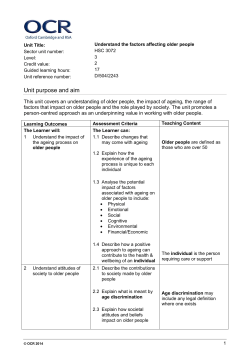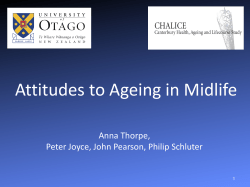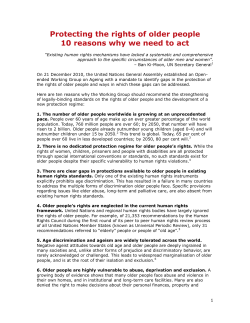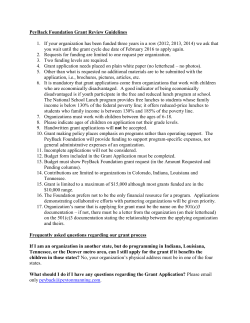
Gender and Ageing Charter - International Federation on Ageing
Gender and Ageing Charter “Gender Equality in an Ageing World” The Gender and Ageing Charter was adopted at the 2nd International Longevity Forum (Rio de Janeiro, Oct. 16-17 2014), an initiative by the International Longevity Centre Brazil (ILC-BR), co-organized by Bradesco Seguros and the Universidade Corporativa do Seguro (UniverSeg) in association with the Centro de Estudo e Pesquisa do Envelhecimento (CEPE), affiliated to the Instituto Vital Brazil (IVB), and partners from academia, government, civil society organizations and agencies of the United Nationsi. Preamble The social construction of gender informs all aspects of ageing in every socioeconomic, cultural and institutional context. Its impact is felt at every stage of the life-course. Rigid prescriptive views on gender roles impose a heavy toll on individuals that result in significant on-going consequences to health and well-being and an enormous underutilization of resources within society. Population ageing and other profound demographic changes mean that inflexible gender roles are no longer supportable. The longevity revolution necessitates the evolution of a new paradigm – one that includes a fresh social contract between women and men. It must be firmly rooted in the Universal Declaration of Human Rights (1948) and incorporate the principles of equality, dignity and accountability. It must lead to more active citizenship, greater social and economic justice and a more inclusive and comprehensive culture of care. There are wide variations in the social architecture of gender both within and between regions. These variations must inform the approaches to address gender disparities. Special attention in all settings must be given to the effects of cumulative gender-based disadvantages. Policy investment that responds to the needs of both current and future older women, who constitute the majority of the older population, is particularly crucial. The research, policy, advocacy and service delivery response to the so-called “feminization of ageing” however, must not neglect specific needs of current and future older men. 2 The Gendered Experience of Ageing Some gender gaps have become less pronounced. The on-going evolution of cultural notions about gender and the emergence of entirely new gender identities are gradually blurring the perceived boundaries between “femininity” and “masculinity”. There remain significant discrepancies between women and men however, in such areas as life- expectancy, health status, economic/personal safety, social/labour participation and burden-sharing. Older adults are shaped by a lifetime of ascribed gender assumptions that influence key judgments about education, career paths, working arrangements, social networks, family, finances and caregiving. The accumulation of these judgments powerfully impacts on the health and well-being of older adults in multifaceted ways and is enormously consequential to the wider society. The Challenges Ahead In the context of rapid population ageing within an increasingly globalized and migratory world, gender equity is essential to harness the full experiences and capabilities of every person. Fast-moving societal change requires a flexible citizenry. Most social systems (labour protection, social assistance, pension and health care) are already being tested by the new demographic realities. There is an economic as well as a cultural pragmatism about the need for a strong gender focus. Fundamental changes in the way we live, work, retire, learn and provide care are required. A failure to respond will produce unsustainable burdens and risk divisiveness between women, men and generations. Potentiality at every stage of the lifecourse must be accepted as a human rights issue in order to realize a comprehensive participation and contribution by every person and to build a fully cohesive society. We additionally need systematic and inclusive data collection and gender-based analysis well into older ages to identify and understand the gaps, to inform actions, to monitor progress and to evaluate impacts. The opportunities to facilitate genuine choices throughout the entirety of the life-course are compelling. Universal Responsibility We declare our responsibility as individuals and societies to end gender discrimination as recognized in the Convention on the Elimination of All Forms of Discrimination against Women (CEDAW, 1979) and the Beijing Declaration and Platform for Action (1995). We must strengthen both international and national laws in relation to the rights of older women and men, seek to refine customary practice at all ages and convene a shared vision of gender equality. We must deliver change through established pillars such as those enunciated in the 3 WHO Active Ageing Policy Framework: health, participation and security (WHO, 2002) and lifelong learning (Kalache, 2013), that reaffirm the UN Principles for Older Persons (1991), complement the Millennium Development Goals (MDG, 2000), the Madrid International Plan of Action on Ageing (MIPAA, 2002), and the Post-2015 Development Agenda on gender equality and the empowerment of women. These four pillars are fundamentally interdependent and together provide a common standard by which individuals, organizations, institutions and governments can be guided and assessed. Health We emphasize that health is a fundamental pre-requisite for quality of life. Its complete realization requires careful attention to all social determinants of health with a strong focus on gender equity. This involves: 1. Promoting health and preventing the onset of disabilities and chronic diseases by reducing their risk factors throughout the life course with particular emphasis on those that are linked to gender. 2. Having equal access to a continuum of gender-appropriate health services delivered by professionals who recognize and respond to the specific physical and psychosocial needs of both women and men of all ages. 3. Establishing coordinated systems of support for caregivers that affirm the social and economic value of care-giving, and that respond to the multiple and diverse roles and needs of the women and men of all ages who provide a wide spectrum of care, whether it is paid or unpaid, formal or informal. Life-Long Learning We recognize that on-going learning throughout life, whether achieved through formal, or informal education, volunteering or other means, is essential to maintain social relevancy. The extra years afforded to life, in combination with the accelerated changes in all spheres of human activity, make the promotion of lifelong learning imperative. Important actions must include: 1. Emphasizing flexible and innovative literacy, educational, training and retraining opportunities for both women and men at all ages according to their needs and 4 aspirations in order to achieve personal fulfillment, security, social cohesion and economic growth. 2. Putting the issue of ageing and its differential impact on women and men in all educational settings and curricula. 3. Promoting self-care and care of others for both men and women at all stages of life. 4. Maximizing the opportunities for intergenerational exchanges within the family, community and workplace that value the skills, experiences, memory and accumulated wisdom of both women and men. Participation We recognize the importance of the empowerment of women and men at all stages of life as a means to facilitate their full participation in all economic, social, cultural and political arenas, including through access to decent work (ILO, 1999) by: 1. Reappraising all gender roles in education, employment, leisure activities, culture and religion across the life course, starting with the critically formative years of youth. 2. Building fair workplace settings that are safe, supportive and fully inclusive of women and men of all ages. 3. Embracing diversity and challenging systemic discrimination, including inter alia, age and gender biases, to widen opportunities for women and men of all ages to better serve their communities. 4. Affirming gender equality as a prerequisite for building a truly democratic society through the full integration of women and men at every age into all civil and political decision-making processes. 5. Upholding the right of women and men of all ages to have access to enabling and supportive environments for personal expression and growth. Security We acknowledge that security (UNDP, 1994) is a fundamental and essential human right and that the protection, safety and dignity of women and men of all ages, with a strong emphasis on the most vulnerable, must be fostered by various means – in particular: 5 1. Responding to the basic needs of all persons with attention to the specific requirements of older women and men, including the right to food, water, shelter, security, occupational safety, health and respect. 2. Alleviating poverty and material deprivation by ensuring equality for women and men of all ages in relation to citizenship rights and access to economic resources and social security. 3. Challenging and addressing gender assumptions about risk-taking and aggression that lead to self-harm and harm to others. 4. Tackling age and gender discrimination, violence, exploitation, abuse and neglect especially during times of conflict and crisis. 5. Tasking judicial institutions and law enforcement agencies to apply all the instruments of justice to promote and defend rights. The Way Forward The transformative nature of global population ageing requires all societies to create new conceptual frameworks. It is necessary to totally reappraise who we are, how we relate to our much extended lives and to each other as women and men – as human beings. We must continue to deepen and expand our understanding about gender through interdisciplinary and inter-sectoral collaboration. Our ingenuity for innovation amidst human diversity will help to actualize this quest in distinctive ways. When gender equality is truly embraced, the skills, experiences and resources of women and men of all ages will be recognized as intrinsic assets for a fully cohesive, fulfilling, productive and sustainable society. i Speakers affiliated to the following organizations: American Gerontological Society, USA; Brazilian Society for Dermatology; Brazilian Society for Geriatrics and Gerontology; Federal University of Rio de Janeiro (UFRJ); Galderma Brazil; Globo Media Network & CBN, Brazil; Government of Canada; HelpAge International; Institute for Applied Economic Research (IPEA), Brazil; International Labour Organization (ILO); International Longevity Centre, Argentina; National Secretariat for Children, Adolescents and Family, Argentina; Organization of Economic Co-operation and Development (OECD); South Australian Health and Medical Research Institute; The Hong Kong Council of Social Service; University of Campinas (UNICAMP); University of Montreal; University of Oxford; University of Sao Paulo (USP); University of Surrey; United Nations Economic Commission for Europe (UNECE); United Nations NGO Committee on Ageing Geneva; United Nations Population Fund (UNFPA); Women & Law in Southern Africa, Mozambique and the World Health Organization (WHO).
© Copyright 2025





















